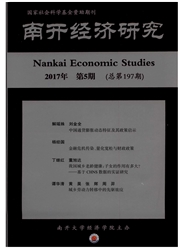

 中文摘要:
中文摘要:
本文在新经济地理的理论框架下着重考察了市场潜力、资源禀赋和税负水平对工业企业区位选择的影响。利用2000--2010年中国286个城市层面的数据,通过对不同时段、不同区域和不同所有制类型的工业企业区位进行分析,结果显示,国内市场潜力和国际市场需求越大,越有利于吸引和培育新企业;沿海地区城市的资源禀赋条件越好,越有利于吸引企业投资;内地地区城市的工业税负水平高、差异大,不利于吸引企业落户;城市内部基础设施和工资水平对工业企业区位决策的影响并不显著。从不同所有制的企业看,国内市场潜力和国际市场需求对外资、私营和港澳台企业区位决策都有显著的正向影响,而城市工业税负水平则起着相反的作用。本文研究表明新经济地理理论对中国工业企业区位进择有较强的解释力。
 英文摘要:
英文摘要:
Using a New Economic Geography (NEG) style model, this paper investigate,; the effect of marker potential, natural resource endowments and tax rates on the location choice of industrial firms in China. By applying 2000--2010 data of Chinese cities', we estimate the effects according to different time periods and different types of firms. The re-. sult shows that market potential (national and international)has obvious positive effects on firms' location. Cities with richer natural resource endowments in the coastal areas of China will attract more firms, while cities, especially those located in the inland of China, with high tax rates attract fewer firms than cities with low tax rates. Transport infrastructures and wage don't prove to significantly affect firms' location. Moreover, we investigate whether the relationships hold for all type of firms. It emerges that market potential promotes firms to agglomeration at cities, while high tax rates play the opposite effect. But the relationship holds for only for non-state-owned firms. Our findings highlight the importance of NEG theory in explanting the industrial firms' location choice in China.
 同期刊论文项目
同期刊论文项目
 同项目期刊论文
同项目期刊论文
 期刊信息
期刊信息
